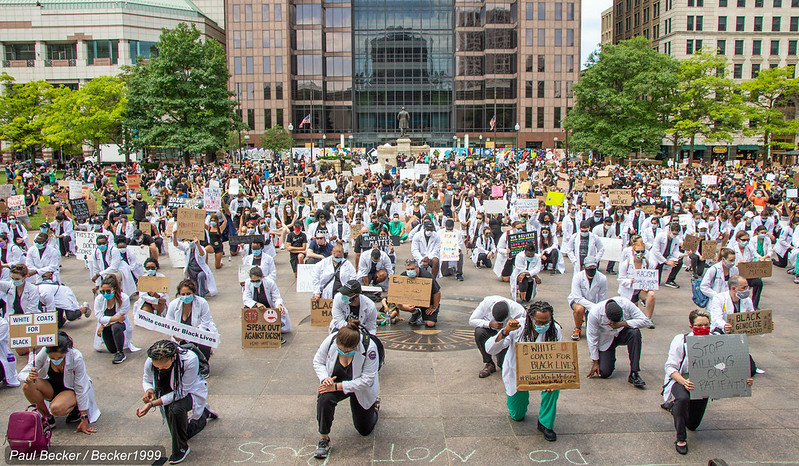In 2018, a patient filed a complaint against a medical student for wearing a “Black Lives Matter” pin on her white coat. When the student reached out to her school’s administration, she received this response: “It is best to not raise barriers in the way we present ourselves … Some of your political pins may offend some people, and it is probably best not to wear them on your white coat or while you are working in a professional role.”
Unfortunately, many medical students are conditioned to such tone-deaf responses from administrators and, thus, feel pressured to hide their convictions in order to placate some patients and superiors. Responses like this send one, unwavering message to all physicians-in-training, one we have heard time and time again: “Stay in your lane.”
This infamous statement, originally tweeted by the National Rifle Association, made headlines in 2018 after Annals of Internal Medicine published recommendations for reducing firearm deaths. After voicing concerns through research, physicians were scolded by the public and social media to stay away from the issue of gun control. While some retreated in response to the political backlash, others rallied under the battle cry, “This is our lane.” Physicians reminded the public that they grapple concretely with the consequences of gun control policies — treating gunshot wounds and breaking bad news to families — all while suffering from PTSD after witnessing horrific gun-related tragedies.
Last year, students were patronized once more for supporting Black Lives Matter to highlight the persistence of institutionalized racism. In response, physicians and students organized the movement, White Coats for Black Lives; once again, the medical community reminded the country who cares for Black lives, many of whom face increased mortality rates from COVID, increased maternal mortality rates, and poorer health outcomes overall.
Responsible gun laws. Black Lives Matter. These are not “political opinions” but rather pleas for social justice that embody the Hippocratic oath of “do no harm.” Despite demands to reduce violence and adverse experiences of our patients, we are often silenced by our respective institutions and by public perception of what doctors and medical students should be learning, doing, and saying. Major journals repeatedly reprimand and disparage the teaching of socially-relevant curricula in medical schools; others suggest that students cannot be both scientists and activists. Yet, these endeavors are not mutually exclusive.
Many members of the medical field have willingly removed themselves from the realm of civic engagement, either because they believe they are “above politics” or because they feel coerced by superiors or colleagues to remain apolitical. Others are simply too tired, too stressed, and too overworked at the end of busy days to pursue the fight against structural issues that affect the health of patients.
This civic apathy is further illustrated by dwindling participation in organized medicine over the last 50 years. In 1975, 75% of U.S. physicians were a part of the American Medical Association (AMA), the political advocacy arm of the medical field; now, that number has dwindled to 15%. In 2018, physicians voted at a rate 14% less than the general population. Despite public opinion of doctors remaining high and their advice being generally well-regarded, doctors feel an immense pressure to remain silent on critical issues.
This shift toward the apolitical, civically-disengaged clinician who prescribes pills without expressing an opinion of our society at large is not a shift toward enlightenment but rather a detriment to the health of our patients and our democracy. To be holistic providers we must investigate and improve the sociopolitical determinants of health that put our patients at risk through measures such as passing broad-sweeping policies among national and specialty medical associations and releasing recommendations for socially-motivated public health crises.
2020 has challenged medical students to interrogate the social environment in which they will eventually provide healthcare. We became socially, culturally, and politically aware and active in larger numbers this year, but we have always been speaking out — against the Vietnam War, against U.S. nuclear proliferation, against racism and a corrupt justice system. When doctors become civically involved, they can make good change, necessary change.
We — the medical students that will be your future doctors — need help to continue from here; in 2021, we challenge medical school administrators to loosen restrictions on student voices. Institutions must redefine the standards of professionalism. Wearing political pins should not be a permanent stain on students’ records. Election Day should be a school-sanctioned holiday. We should be allowed, if not encouraged, to bridge the gaps between political ideology and patient care so that we can continue to advocate for our patients, both inside the clinic and out.
Image credit: 02aIMG_4857 (CC BY 2.0) by Becker1999

